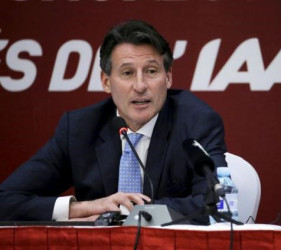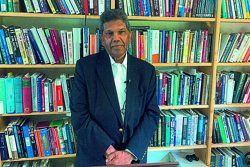BEIJING, (Reuters) – Sebastian Coe was elected as the new head of international athletics yesterday and promised to stand by his campaign pledge to set up an independent anti-doping body for the embattled sport.

The International Association of Athletics Federations (IAAF) has been battered by allegations over the last three weeks of widespread doping in track and field.
While the 58-year-old Briton said an independent body was the only way to ensure an end to any question about the IAAF’s vigilance, he also said he was inheriting a “very strong sport” from Senegalese Lamine Diack.
A twice Olympic 1,500 metres champion, and head of the organisers for the 2012 London Olympics, Coe won the presidency by beating Ukraine’s Sergey Bubka 115-92 in a ballot of the IAAF’s 50th Congress.
He starts his new job on Aug. 31, the day after the world championships end in Beijing.
“I’ve had the joys of Olympic competition, I’ve had the joys of being part of something special in London a few years ago, but this for me is the pinnacle,” he said.
“It is my sport, it’s my passion, it’s the thing that I’ve always wanted to do.
“I will do everything within my human capabilities to make sure our sport maintains the values, maintains the strong legacies and the very, very firm foundations that President Diack has left me,” he added.
“This is a sport that is strong, I have the responsibility to make it stronger, and I will.”
The election took place against the background of a public relations crisis for the IAAF, which was accused of failing in its duty to address the scourge of doping.
A former Conservative politician in Britain, Coe has aggressively defended the IAAF’s record on doping since the leak of blood test data to the media.
But on Wednesday, he made no mention of the subject in his speeches to delegates before and after the vote, only addressing the issue at the ensuing news conference.
“There is zero tolerance to the abuse of doping in my sport and I want to continue that,” he said.
“I will maintain that to the very highest level of vigilance.”
The plan to establish an independent anti-doping agency was one of the central pledges in a campaign that has taken Coe 700,000 kilometres around the world.
“There is a universal problem with (doping) in sport. We recognise that and we’ve been in the lead role as long as I’ve been in the sport,” he said.
“That’s something I’m very proud of… (but) we do have to recognise that there is too broad a view that this is something where, whether it is real or perceived, there are conflicts and there are loopholes.
“I think an independent system is what we need to close down any thought that we are doing anything other than being entirely vigilant about that.”
The head of the World Anti-Doping Agency (WADA), the body which currently oversees doping control around the world, congratulated Coe on his victory.
“We look forward to a positive and strong relationship with the new president in his avowed plans to protect the rights of the clean athlete,” WADA president and fellow Briton Craig Reedie said in a statement.
Former Olympic pole vault champion Bubka also congratulated Coe on his victory and was later elected one of four IAAF vice presidents, along with Cuban Alberto Juantorena, Qatari Dahlan Al Hamad and Hamad Kalkaba Malboum of Cameroon.
“I know athletics will grow and become stronger,” Bubka said. “I am a happy man because I love athletics. I will continue to serve athletics with passion. This is my life.”
Outgoing president Diack, who has run the body for the last 16 years, said he was delighted to finally have a successor.
“The white-haired generation has done what it could, and now over to the black-haired generation,” he said.









